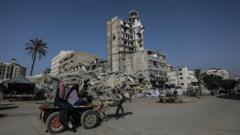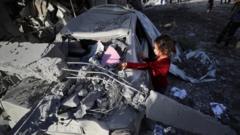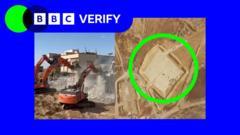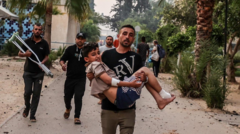As the military conflict in Gaza continues to intensify, the Israeli government has issued a sweeping evacuation order for civilians residing in Gaza City, heightening fears of further casualties.
Israel Issues Urgent Evacuation Order Amid Intensifying Military Campaign in Gaza

Israel Issues Urgent Evacuation Order Amid Intensifying Military Campaign in Gaza
Amid escalating conflict, Israel orders large-scale evacuations in Gaza, raising humanitarian concerns.
With areas of Gaza City already devastated by ongoing bombardments, residents sheltering there are urged to leave for their safety ahead of what the Israel Defense Forces (IDF) have termed "intense strikes." Among the sites identified for evacuation are key locations, including the Islamic University and Al-Shifa Hospital, which Israel claims are being utilized by Hamas for military operations. However, local officials and humanitarian organizations contend that these sites host thousands of civilians who could face dire consequences if forced to evacuate swiftly.
This evacuation order signals Israel's intent to considerably escalate its military actions in the region, an approach which has garnered criticism from within Israel's own political circles. Former Prime Minister Ehud Olmert has vehemently opposed further military expansion. In a BBC interview, he expressed his belief that a significant portion of the Israeli populace, including military leaders, is aligned against the continuation of the current military strategy, seeking an immediate cessation of hostilities.
Olmert's condemnation echoes broader sentiments of concern for the humanitarian crisis unfolding in Gaza, with many activists and international leaders denouncing Israel's tactics. French President Emmanuel Macron's comments, referring to Israel's operations as "shameful," underscore the growing global unease regarding the war's toll on civilians.
As the humanitarian situation deteriorates amid a prolonged blockade, recent assessments indicate that the 2.1 million-strong population in Gaza faces a "critical risk" of famine. The World Health Organization has voiced alarms over the long-term impact on a generation due to severe shortages of nutritious food, clean water, and healthcare.
Israeli officials maintain that hunger in Gaza is a consequence of Hamas's actions, asserting that the region is not facing famine. However, the ongoing airstrikes have resulted in significant casualties, with reports indicating nearly 2,800 deaths since mid-March, according to Gaza's health ministry.
In the midst of this turmoil, there are indications that a proposed U.S.-backed ceasefire could potentially be reached, contingent upon the release of hostages by Hamas. Yet, Israeli Prime Minister Netanyahu remains steadfast in his commitment to continue military operations, dismissing proposals for peace at this time.
Public sentiments indicate a desire for resolution, as evident from a recent poll revealing that a significant majority of Israelis support a hostage deal with Hamas, even if it necessitates halting military action. But Netanyahu’s administration is reportedly unyielding, stating that the war will carry on unimpeded.
Israel initiated its military campaign on October 7, 2023, following a severe cross-border assault that resulted in considerable loss of life and hostage-taking. Since then, the situation in Gaza has escalated dramatically, with the local health ministry reporting more than 52,900 casualties as the humanitarian crisis deepens.
With the implications of this ongoing conflict profound and far-reaching, calls grow for immediate action to address the humanitarian needs of Gaza's civilian population.
This evacuation order signals Israel's intent to considerably escalate its military actions in the region, an approach which has garnered criticism from within Israel's own political circles. Former Prime Minister Ehud Olmert has vehemently opposed further military expansion. In a BBC interview, he expressed his belief that a significant portion of the Israeli populace, including military leaders, is aligned against the continuation of the current military strategy, seeking an immediate cessation of hostilities.
Olmert's condemnation echoes broader sentiments of concern for the humanitarian crisis unfolding in Gaza, with many activists and international leaders denouncing Israel's tactics. French President Emmanuel Macron's comments, referring to Israel's operations as "shameful," underscore the growing global unease regarding the war's toll on civilians.
As the humanitarian situation deteriorates amid a prolonged blockade, recent assessments indicate that the 2.1 million-strong population in Gaza faces a "critical risk" of famine. The World Health Organization has voiced alarms over the long-term impact on a generation due to severe shortages of nutritious food, clean water, and healthcare.
Israeli officials maintain that hunger in Gaza is a consequence of Hamas's actions, asserting that the region is not facing famine. However, the ongoing airstrikes have resulted in significant casualties, with reports indicating nearly 2,800 deaths since mid-March, according to Gaza's health ministry.
In the midst of this turmoil, there are indications that a proposed U.S.-backed ceasefire could potentially be reached, contingent upon the release of hostages by Hamas. Yet, Israeli Prime Minister Netanyahu remains steadfast in his commitment to continue military operations, dismissing proposals for peace at this time.
Public sentiments indicate a desire for resolution, as evident from a recent poll revealing that a significant majority of Israelis support a hostage deal with Hamas, even if it necessitates halting military action. But Netanyahu’s administration is reportedly unyielding, stating that the war will carry on unimpeded.
Israel initiated its military campaign on October 7, 2023, following a severe cross-border assault that resulted in considerable loss of life and hostage-taking. Since then, the situation in Gaza has escalated dramatically, with the local health ministry reporting more than 52,900 casualties as the humanitarian crisis deepens.
With the implications of this ongoing conflict profound and far-reaching, calls grow for immediate action to address the humanitarian needs of Gaza's civilian population.






















